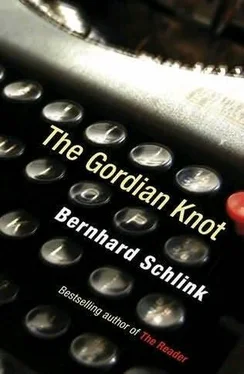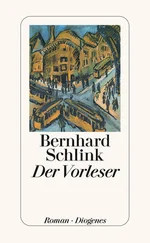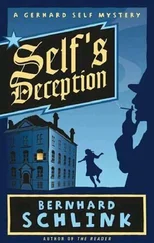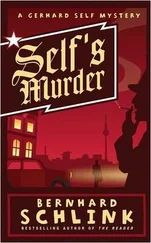He found it hard to talk, not only because he was worried he would reveal too much, but because he was out of practice. In the past he had enjoyed intellectual exchanges: talking about books, movies, politics, and at the same time talking about oneself, mirroring what one had read or seen in one’s own experience, and then presenting one’s experience in general terms, grasping and analyzing developments and relations of others as prototypes. He could no longer do this. He hadn’t done any of this since he had moved from Karlsruhe to Cucuron, and after he had taken over Maurin’s translation agency in Marseille, he had barely read a book or seen a movie. With Françoise he had only spoken about everyday matters. When friends had come from Germany, they had talked about what they were doing and about old times. Georg felt foolish next to Helen, who drew parallels between her students and students in general, spoke about the fairy tales she was working on for her dissertation, trends in the German short story, and Germany’s turmoil in the nineteenth century; about National Socialism, anti-Semitism, and anti-Americanism; and of her experiences as a student in Trier.
“Did you visit Marx’s birthplace in Trier?” he asked.
Helen shook her head. “Have you?”
“No.”
“Why bring up Marx?” she asked, relieved that he had said something after his long interlude of nodding and smiling. She reached for her glass and took a sip.
“I’ve been thinking about something he wrote that has to do with changing and interpreting the world,” Georg said, and tried to explain why it was important not to take others’ behavior as they mean it, but to determine the meaning oneself.
“Isn’t that… isn’t that what the insane do?” Helen said. “Not caring about what people mean, but seeing in other people’s actions what they want to see?”
“What they want to see, or what they are compelled to? If they can choose, then they live with freedom of action instead of having to react. And freedom of action doesn’t automatically bring success and happiness. Moreover, when dealing with those whose behavior is so powerful that one can only react, insanity is perhaps better than submission.”
She didn’t understand him. He didn’t understand himself either.
“Is that what you’re writing about?” she asked.
He looked at her. “Are you joking?” he said. “We’ve been sitting here for two hours, and I can’t even talk properly about students, books, and politics, and you expect me to write about philosophy or whatever?”
“The problem here seems to be linguistic.”
“Fair enough. I’m sorry I asked you out. I’ve ruined your evening. I didn’t realize that I’ve”-he couldn’t find the right expression-“that I’ve lost so much of my social skills.”
The check had been lying on the table for some time. He took some money out of his pocket. She watched him silently, her eyes once again careful. They got up, and he walked with her along Broadway and then up Riverside Drive to where she lived.
“Do you want to come up for a drink?”
They hadn’t said a word all the way to her place. In the elevator she asked him what his sign was, and he asked her what hers was. They were both Capricorns. In her apartment, she asked him about Françoise.
“Do you love her?”
“I don’t know.”
“Why are you avoiding my question?”
“Why are you asking? I mean, why are you asking whether I love her?”
“I’d like to know more about you, so I have to start somewhere.”
“I don’t know a lot about you either.”
“That’s true.”
He looked at her. Her eyes were cautious again. Perhaps her cautiousness has nothing to do with me, he thought, perhaps it’s always there. What striking features she has. She’s attractive in a sharp sort of way. And still, even with her hair drawn back into a stern ponytail, she looks friendly.
She smiled. “Would you like to see me again?”
“Yes, I would.” He was sitting next to her on the couch, and caressed her hand, his fingers running along her veins. “I don’t have much money left. Would a walk through Central Park with a Coke and french fries on a park bench be okay?”
She nodded.
“Then I’ll be on my way.”
“Stay.”
He stayed. He woke up often and looked at her as she slept lying on her back in her buttoned-up nightdress, her arms stretched out beside her. The cat was sleeping at his feet. The warmth of the shared bed and the memory of her embraces were pleasant. It was like a homecoming. But always, when he came home, he doubted whether he still belonged there.
TWICE THE FOLLOWING DAY GEORG was under the impression that he had seen the same balding man in a gray shirt, light brown pants, and black shoes following him. But he wasn’t sure. The day after, Georg was waiting for the bus on Sixth Avenue. It was four o’clock and the street was busy, but it was before rush hour. When the light turned red, there was silence for a few seconds before the traffic came pouring in from the side streets.
He was tired, and only looked up from time to time to see if his bus was coming. He wouldn’t have looked across the street if a truck hadn’t rammed a cab. And he wouldn’t have noticed the redhead, who had been standing behind the truck and now slowly walked on.
Georg looked down the avenue again: there was no sign of a bus. He picked up his plastic bag and started walking. He walked slowly so that the redhead could follow him, but with determination, as was to be expected from someone who has waited long enough for a bus and decided it would be faster to walk. Sixth Avenue, Forty-second Street, Vanderbilt Avenue. The whole way, he didn’t look back. If the redhead wasn’t following him, too bad. Before going into Grand Central, he dropped a coin and bent down to look for it. People bumped into him and squeezed past. Twenty-one, twenty-two-he counted with clenched teeth. This had to be enough time for the redhead to have seen him. He straightened up and went into the station.
Aha, Georg thought, I see that I can’t get away from cathedrals. The high, flat vault, and in front a gigantic photograph of hot-air balloons before liftoff. The broad steps to the left and right leading down from the street to the hall were worthy of a palace, but of a cathedral too. In the middle of the hall was a circular information booth of stone and transparent, dark blue glass with a brass sphere on top that proclaimed the time from four round dials in four directions. It looked almost like a monstrance. Georg walked down the stairs and found his bearings. To his right was the ticket counter, and above it the boards with the arrival and departure times of the trains. It was twenty past four, and at four-forty there was a train bound for Stamford. He bought a ticket for White Plains. Now he could while away the time. He strolled through the main concourse, peering into the passageways leading down to the trains. He read the flickering electronic signs indicating the share prices and currency exchange and the prices for cotton, coffee, and sugar. He went into a smaller hall where there was a newspaper stand, heavy wooden benches, and restroom signs. Five chandeliers hung from the five vaults of the ceiling.
He sat down on a bench and took a newspaper out of his bag. Has he followed me? Is he watching me? While he was strolling through the halls Georg hadn’t seen the redhead; he hadn’t wanted him to realize he was keeping an eye out for him. Can he watch me discreetly in such a place, or did he see me buying a ticket and is waiting for me to come back into the concourse before my train leaves?
He got up and followed the sign to the men’s room-a hallway, a door, a large white room with a long row of urinals and men’s backs, and on the other side a long row of white doors. A janitor in white overalls was cleaning the washbasins, humming a song.
Читать дальше












